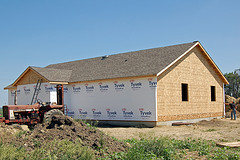Does a Brand New Home Keep Its Value?
 No doubt about it, a newly constructed home has tremendous appeal. Everything is fresh and clean, just waiting for you and your family to move in, and the finishes and fixtures are exactly what you want. True, new construction costs quite a pretty penny, but you're sure it will be worth it. Or will it? Will your brand new property keep its value … or might it be like a new car, which starts depreciating the minute you drive it off the lot? The answer, you'll see, is not so simple.
No doubt about it, a newly constructed home has tremendous appeal. Everything is fresh and clean, just waiting for you and your family to move in, and the finishes and fixtures are exactly what you want. True, new construction costs quite a pretty penny, but you're sure it will be worth it. Or will it? Will your brand new property keep its value … or might it be like a new car, which starts depreciating the minute you drive it off the lot? The answer, you'll see, is not so simple.
Compare New Construction with Resale Homes
Compare properties currently on the market -- both new construction and resale -- in terms of price, size, and amenities. Bear in mind, though, that you're looking at apples and oranges; new construction homes are built to the latest standards of energy efficiency, while older houses usually have the advantage of larger rooms and thicker walls.
Recognize that new construction tends to cost more than resale, so it will take you a while to build up equity. If you do buy new, make sure that you take advantage of all the perks the home builders may offer, which could range from a kitchen upgrade to a lower interest rate on your mortgage.
Where and When to Buy
Location, location, location is the watchword for real estate investment. Choose carefully where to buy. A new neighborhood that offers a relatively short commute plus access to the infrastructure of an established urban area -- without the sky-high prices -- is ideal.
On a personal level, be sure that you will want to stay in this particular area, in this particular house, for a minimum of 5 years. Otherwise, you're likely to lose a considerable amount on relocation, what with closing costs, moving expenses, new utility hookups, and the like.
When purchasing in new housing developments, last is not least. If you buy in toward the end of the project, you'll have a chance to see how the area is shaping up as a community and who your neighbors will be. And if for some reason, you need to sell in a year or so, your home won't be competing with newer properties right next door.
New Construction Insurance
Before you commit to a new property purchase, find out whether you’ll be able to get homeowners insurance for your chosen location and if additional flood or earthquake coverage is advisable. Then go ahead and purchase your policy prior to the start of construction, so you’ll be protected in case of a liability claim during the building process. In addition, you may want to take out builder’s risk insurance if you hire a contractor to custom-build your home.
Tips to Help Protect Your New Home's Value
- Investigate the warranty offered by the home developers. Typically this guarantees appliances and systems for a year and structural elements for 10 years. Find out which issues the warranty includes. What action will it require the builders to take in case of problems, whether major foundation cracks or small flaws like broken backsplash tiles?
- Hire a qualified home inspector as a third party to check your new property and to represent your interests at the scheduled construction inspections.
- For your decor, choose neutral colors and styles. Avoid cluttered design -- if you must install a kitchen island, for example, make it (re)movable -- and faddy trends that will look dated in another 5 or 10 years.
- Once you've moved in, take good care of your new house and landscape. Regular maintenance will help you enjoy your property more, reduce the risk of future problems such as mold infestation, and help your home keep its value.
Laura Firszt writes for networx.com.
Looking for a Pro? Call us (866) 441-6648

Remodeling Average Costs
Remodeling Contractors Experiences

My Deck Repair Was Simple But Perfect

I Needed To Install Shower Safety Rails After My Knee Surgery



